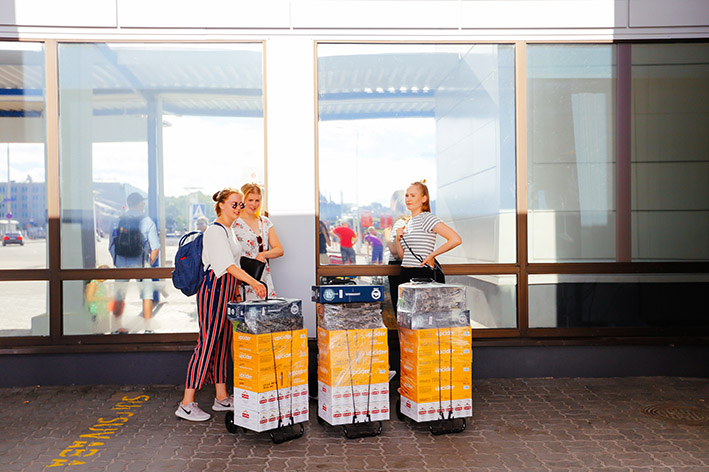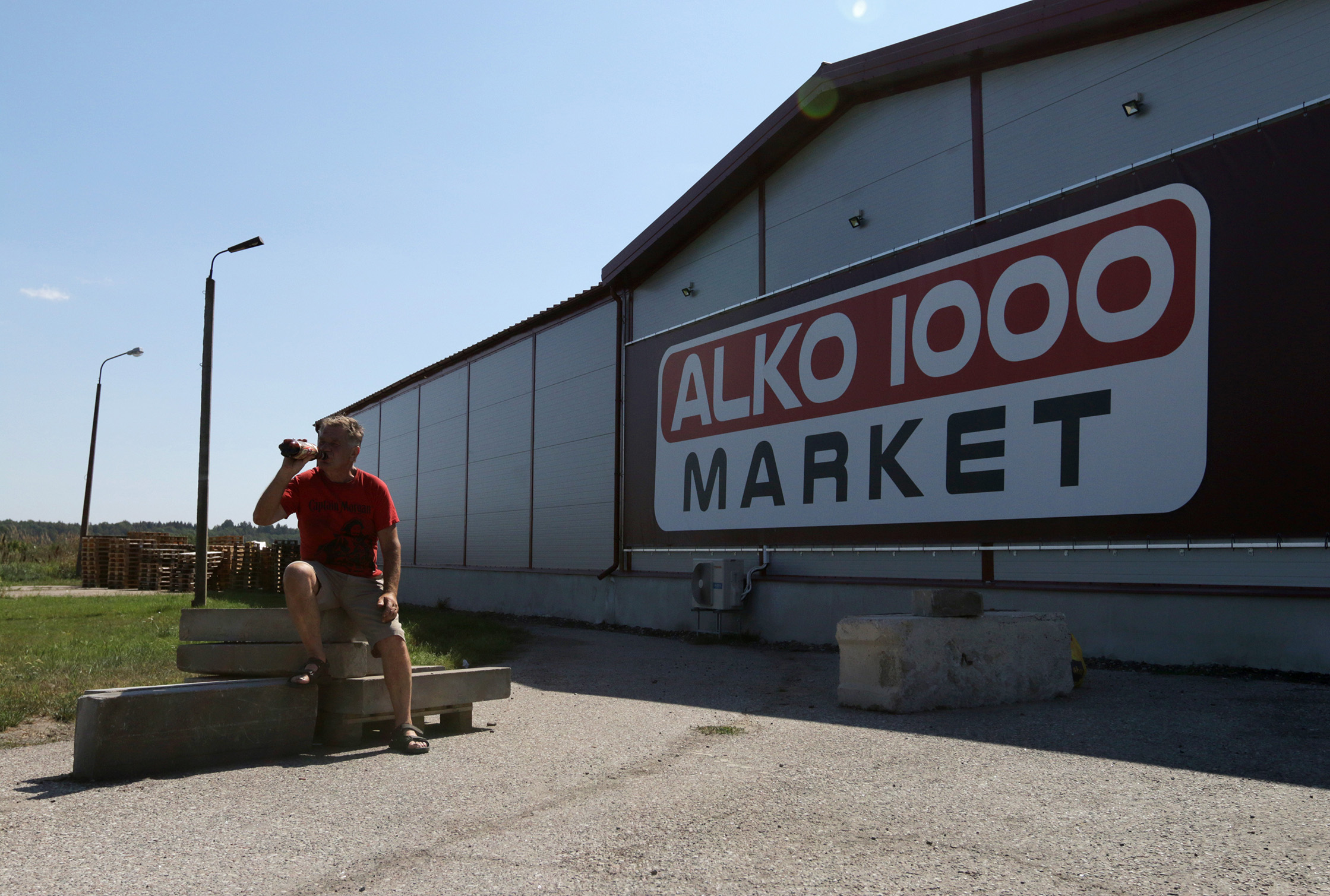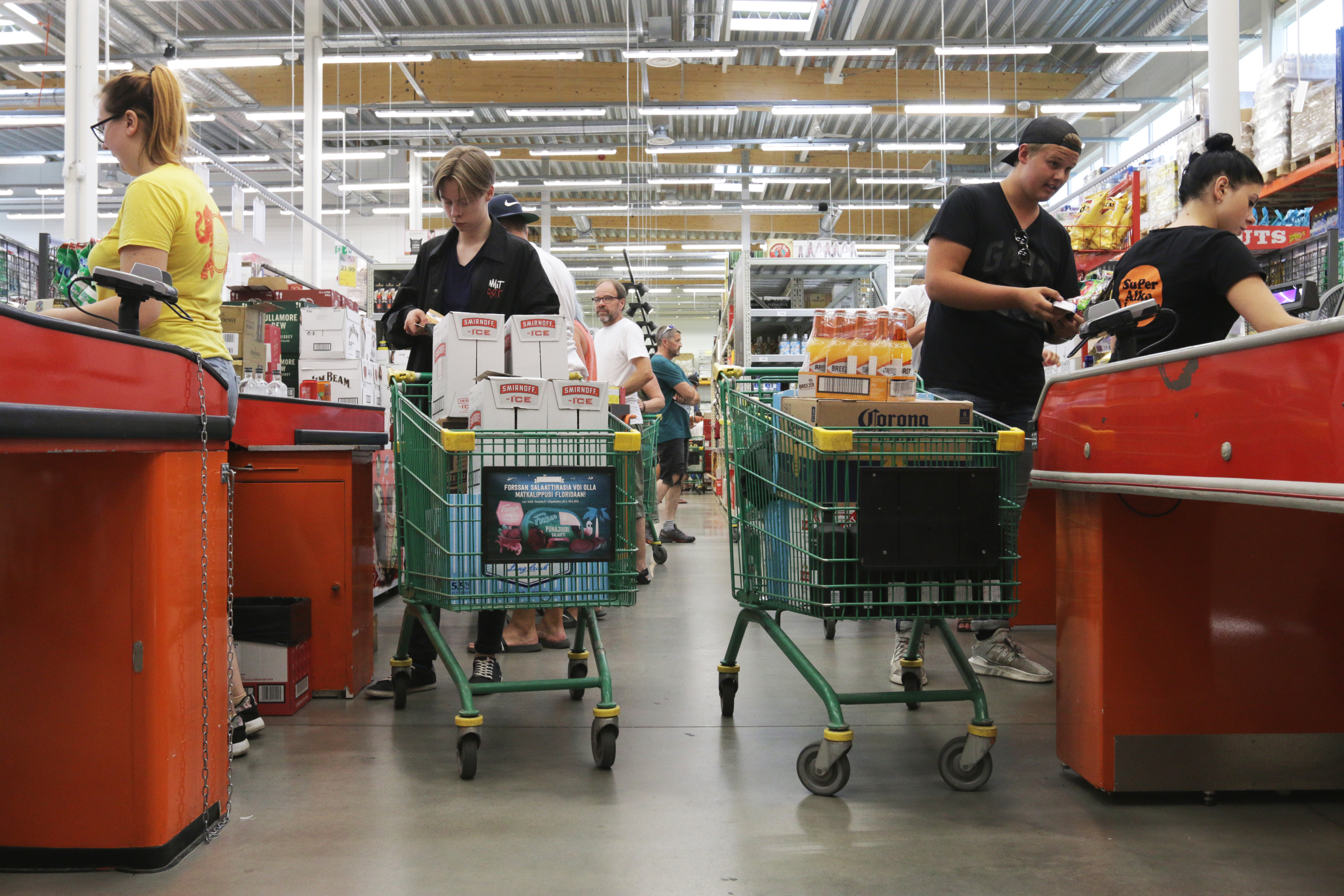Go-Far 2018: Eye on Estonia

Alcohol Tax Fails to Curb Thirst for Booze
A 70 per cent tax hike on alcohol last July to curb alcoholism has instead created a black market in Estonia, while businesses and citizens have come up with new ideas to beat the steep duties.
Story and photos by Dewey Sim
Turning off the engine to his black BMW sedan, “Mr Kukk” sits with bated breath. The teenager steals several glances at his side and rear mirrors. The coast is clear.
He darts out, furtively dropping a bag of vodka at the door of an apartment, then dashes back into his car.
It is just after 10pm, but the night is still young for the 18-year-old, who has just made his first delivery.
Mr Kukk, who declined to give his name, is among a growing number of unauthorised dealers in Estonia’s alcohol black market.
Demand for black market alcohol has grown since the government raised duties by 70 per cent in July last year, in a bid to tackle the country’s struggle with alcohol.
Estonians consume the largest amount of alcohol among OECD countries, a 2015 report showed. The average Estonian adult drinks 12.3 litres of alcohol each year, as compared to the OECD average of 9.1.
A 10pm sales curfew on alcohol has been in place since 2008, but the tax hike seems to have made alcohol even more of a forbidden fruit for Estonians, fuelling unintended consequences for the Baltic state’s alcohol industry.
Besides an emerging black market, more Estonians are also flocking to Latvia in search of cheaper alcohol, harming local businesses. “On Friday and Saturday nights, I can get really busy and can earn up to 500 euros per night,” said Mr Kukk, who holds a day job that he declined to reveal.
“But I know people who do not have a day job and do this for a living. You can never imagine how much alcohol Estonians drink.” Mr Kukk makes weekly trips across the southern border to Latvia, where he gets his stash of alcohol in bulk. A bottle of vodka that costs 20 euros in an Estonian store is sold at 10 euros across the Latvian border. Mr Kukk then resells the alcohol at three times the purchase price.
Despite the tax hike, Mr Kukk’s alcohol is still more expensive than those sold by legitimate merchants. And yet, Mr Kukk suggests the growth in black market demand could be due to a rebellious streak by a small minority of Estonians to go against what they see as unfair policies, and purchases by Estonians who run out of alcohol at night.
Going South

Estonians travel to the Latvian border to purchase alcohol in bulk.
Like Mr Kukk, other Estonians are also travelling to Latvia en masse to stock up on alcohol, albeit for their own consumption.
The three-hour drive does not put off Estonians seeking a steal: every weekend, lines of vehicles — chartered buses included — fill the parking lots at SuperAlko, one of the many liquor megastores on the Latvian side of the border.
A Facebook page “Favourable Goods From Alko, Latvia”, with more than 1,400 members, sees regular carpooling trips to Latvia being organised to save up on fuel.
Finnish tourists, who previously entered Estonia just to buy cheaper alcohol, now head to Latvia too.
Mr Markku Takala, who makes the five-hour journey by ferry and car from Helsinki to Latvia about thrice a year, said he buys up to 2,200 euros worth of alcohol.
“We can save up to 60 per cent depending on what kind of alcohol we want to bring back,” said Mr Takala, 47.
Estonian Vitali Donskoi, 27, said beer prices at Tallinn’s Old Town, his usual drinking haunt, have jumped by over three times since the tax hike, from two to seven euros a pint.
“Many of us Estonians travel to the border on Thursdays and Fridays, or on days before public holidays to stock up on alcohol for parties over the weekend,” said Mr Donskoi, who works in the tech industry.
It is not illegal for Estonians to cross over to Latvia to purchase alcohol in bulk as long as it is for their personal consumption, said Estonia’s Tax and Customs Department. Every adult that enters Estonia from another EU country is allowed to carry up to 110 litres of beer, 90 litres of wine and 10 litres of strong alcohol.
The department is, however, preparing to combat the “formation of illegal networks engaged in trade of alcohol imported from Latvia” and plans to plant surveillance cameras at border control checkpoints in the future, local media reported.
Home Brew
While some Estonians cross the border for cheaper booze, others are brewing their own alcohol at home.
Mr Alvar Uusmann, 33, has succeeded in brewing different types of beer, including Mexican lager, stout, pilsner and ale.
The sales manager said: “It’s just so easy with the brew concentrate. You mix it with yeast, water and sugar and let it ferment, and then just bottle it.”
“I brew beer because it is cheaper (than buying beer) and it’s also quite interesting to learn new skills.”
Small Changes
As Estonians resort to alternate means to beat the high taxes, local breweries have taken a hit.
Head of the Estonian Breweries Association Peter Võrk has urged a rethink of the tax hike, citing the negative impact it has had on Estonia’s economy.
Duties from beer sales dropped over 40 per cent, or over 100 million euros, from 2016 to last year.
“We are gifting more than 100 million euros in taxes per year to the Latvian state,” Mr Võrk told local media. He added that the government should “reduce the excise duty rates to a competitive level” to eliminate cross-border trade with Latvia.
Data published by the Estonian Breweries Association in July showed that alcohol sales at the Latvian side of the border grew 80 per cent in the first half of 2018 compared to the same period last year.
A total of 12.6 million litres of alcohol were sold from January to June – a jump from 7.12 million last year – and numbers are expected to climb to a record 32 million by end-2018.
For Saku Brewery, Estonia’s largest brewery, the demand for bulk purchases across the border has prompted a repackaging of its products. The brewery currently supplies its alcoholic products to over 1,500 stores in Estonia.
“Our packaging has shifted greatly towards bigger-sized multi-packs at the border because people are buying in large quantities there,” said Mr Jaan Harms, Saku Brewery's head of marketing and sales.
Saku Brewery also has seven Latvian stores that accounted for nearly 40 per cent of its overall beer sales to Estonians this summer. Yet, the company also reported a drop in overall sales by 13 per cent for the first half of the year.
Under Pressure

Finnish tourists, who used to buy alcohol in Estonia, now charter buses to go to Latvia to stock up alcohol.
The tax hike, meant to curb alcoholism, has also led to unexpected outcomes: an increase in drink driving and alcohol addiction cases in the past year.
Since the hike in July last year, alcohol consumption has increased by 0.7 per cent to 10.3 litres per adult per capita after three years of steady decline, said a study by the Estonian Ministry of Social Affairs.
The new policies have also failed to curtail drink driving. Over 3,300 motorists were arrested in the first half of this year, said Estonia’s Police and Border Guard Board, up from 3,194 during the same period last year.
Alcohol policy expert Triinu Täht, from Estonia’s Department of Public Health, said she believes the policies have been effective in helping a “majority of the population”, though it might have sparked new trends.
“A part of the population has taken up an entirely new habit – purchasing their alcohol from Latvia. We need to see the results over a longer period of time to assess the impact of the measures,” she said.
The finance ministry, too, added that it is aware of the growing illicit black market of alcohol. Checks with the ministry’s Tax and Customs Board showed that 2,250 litres of illegal alcohol were found in the first half of 2018, as compared to 3,800 litres for the whole of last year.
As unauthorised dealers like Mr Kukk continue to thrive in Tallinn’s Old Town, a huge challenge remains for the government to quench Estonians’ thirst for booze.
“People buy so much alcohol from me every night that I need to go to Latvia every week to bring more alcohol,” he said.